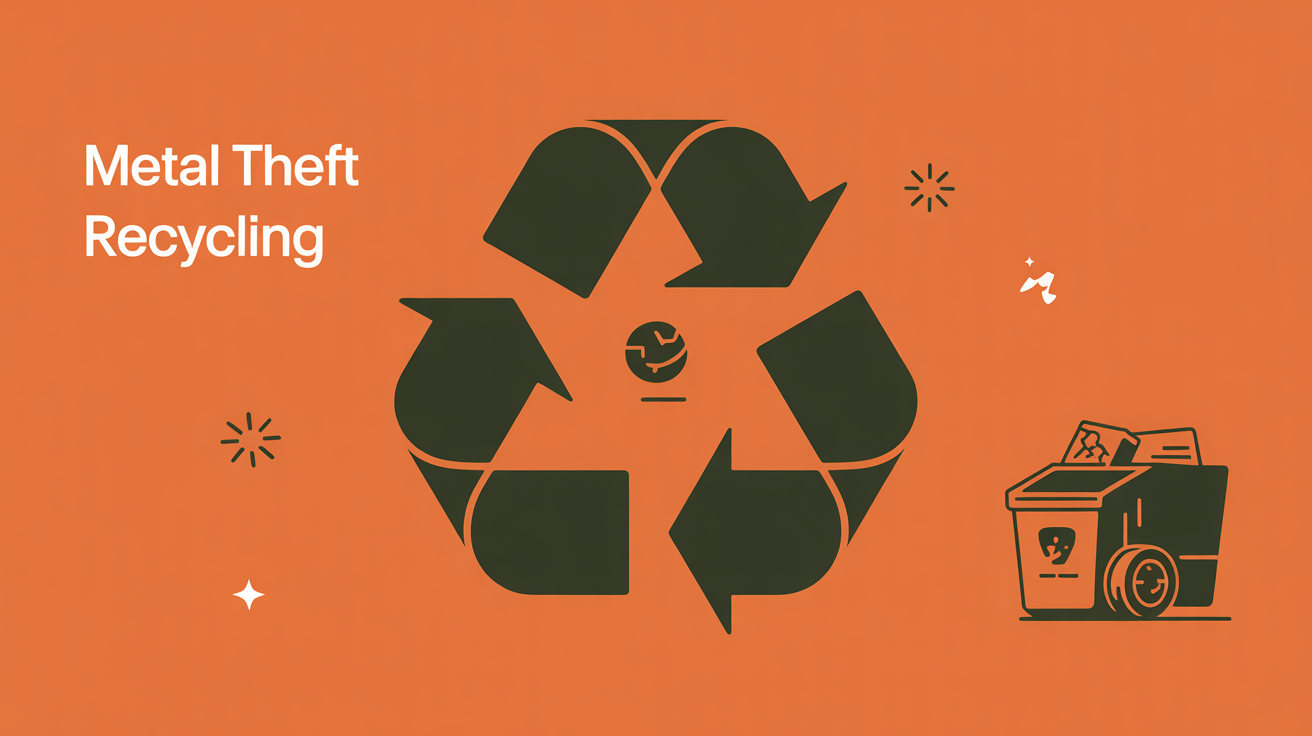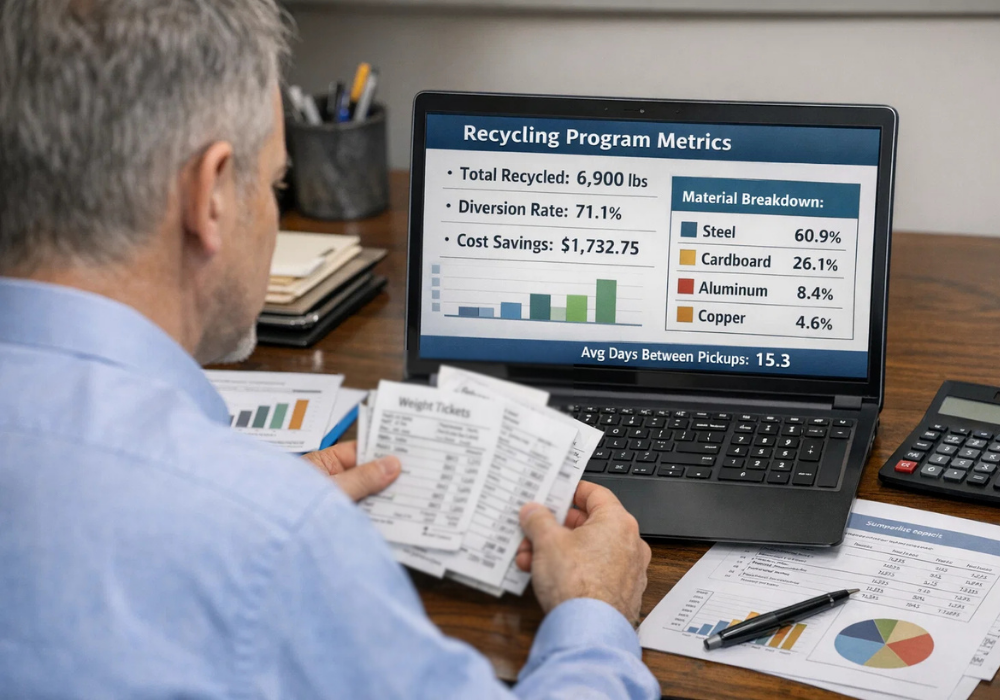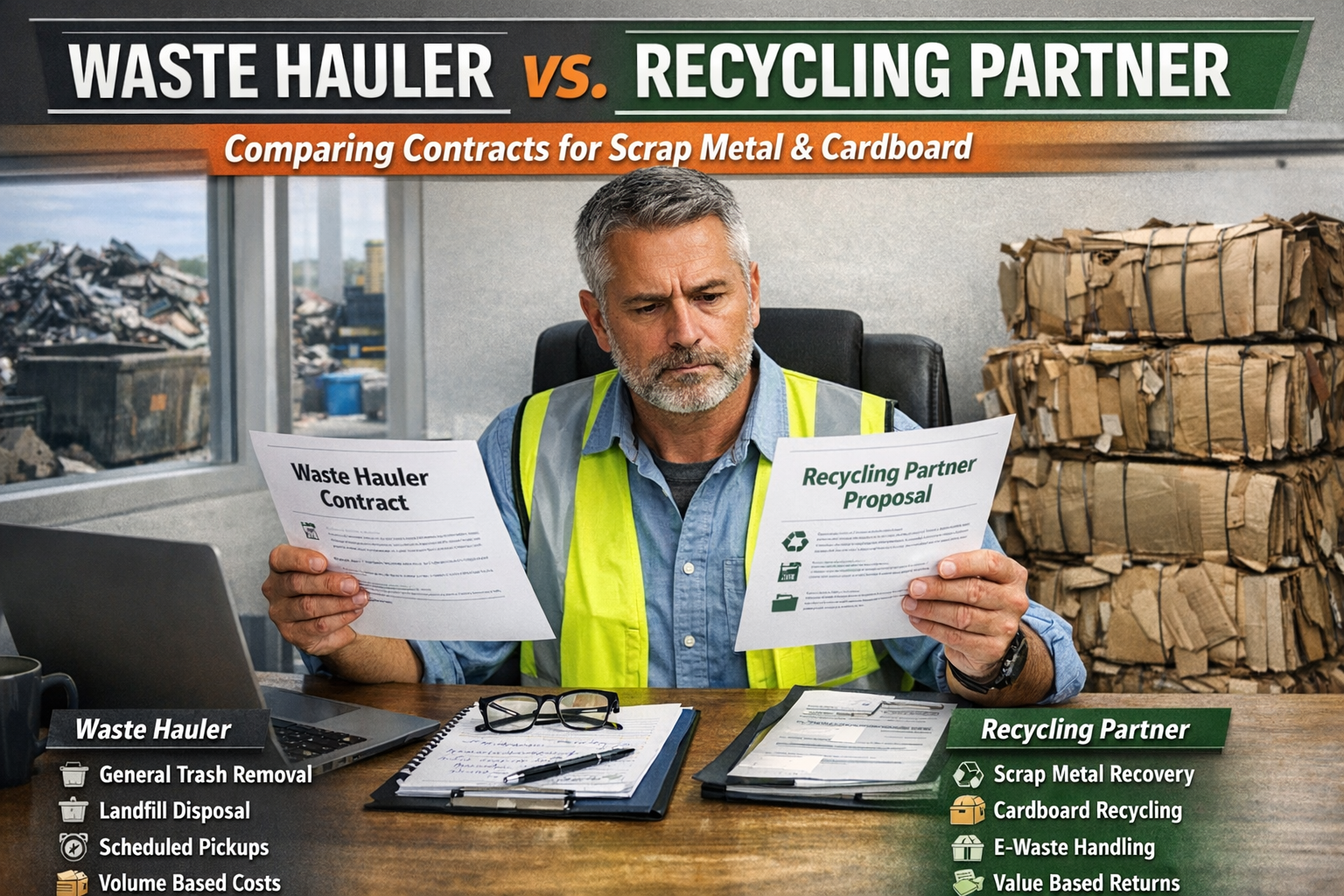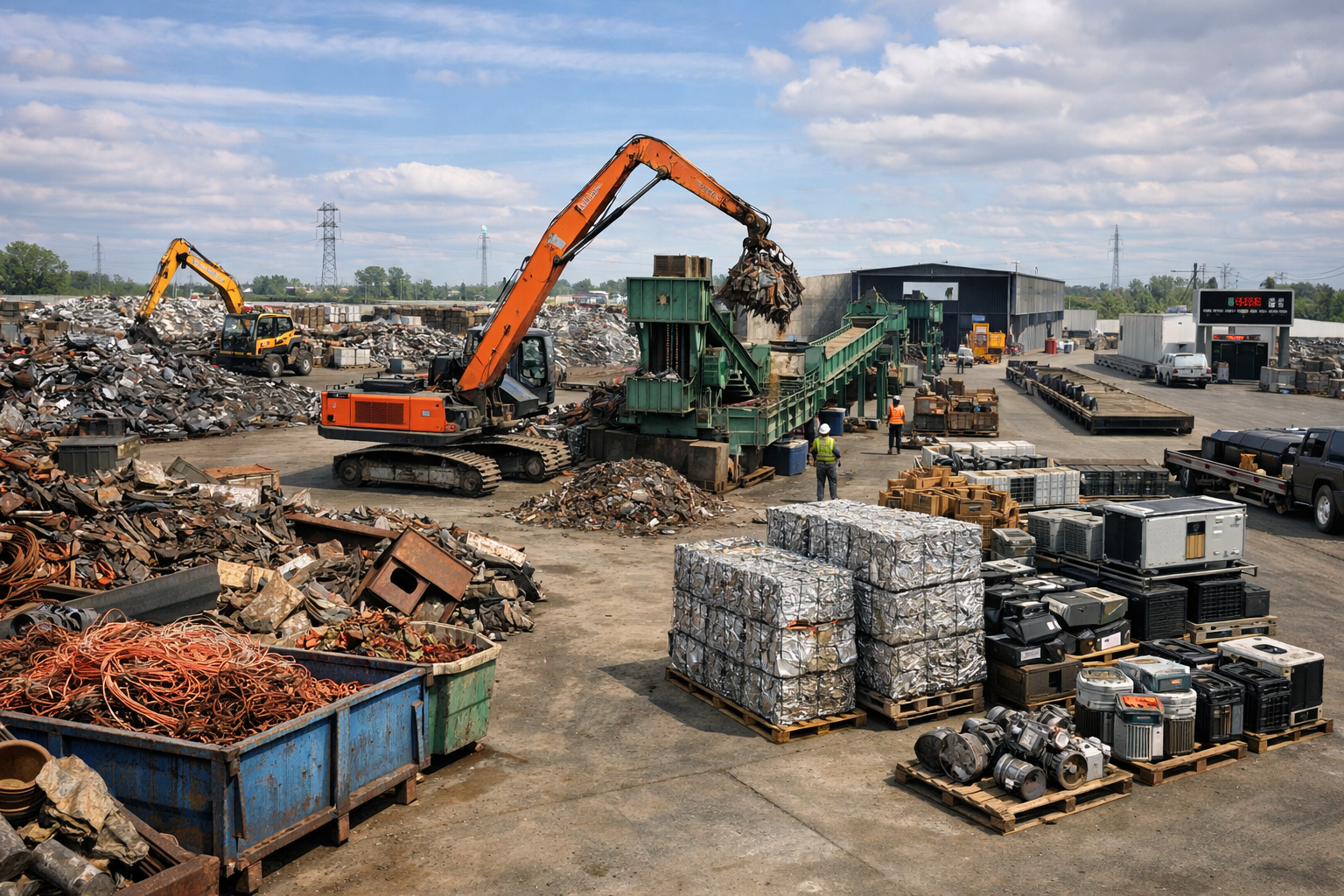Featured Snippet
Metal theft costs California businesses over $1 billion annually through stolen copper wiring, HVAC components, and construction materials. Legitimate recyclers follow strict ID verification and record-keeping requirements under California law. Working with certified recyclers like Willis Recycling helps prevent illegal scrapping while providing secure, documented recycling services that protect businesses from liability and comply with state regulations.
The Growing Problem of Metal Theft Recycling in California
Metal theft hits businesses hard. Construction sites wake up to find copper wire gone overnight. Facilities discover HVAC components stripped away. The losses add up fast—not just in replacement costs, but in project delays, insurance claims, and operational headaches that can last for weeks.
California businesses face particularly high risks. The state's strong recycling market and high metal prices create opportunities for thieves. Copper theft alone causes significant infrastructure damage across the state, with criminals targeting everything from building wiring to utility equipment.
But here's what many business owners miss: choosing the right recycling partner is one of your best defenses. A reputable recycler doesn't just process your scrap metal—they help protect you from becoming a victim or an unwitting participant in the metal theft cycle.
How California Protects Businesses Through Recycling Laws
Understanding the State's Requirements
California enforces some of America's strictest metal recycling regulations. These laws exist to combat theft and protect legitimate businesses. The state's Business and Professions Code requires all recyclers to verify seller identification using government-issued ID, maintain detailed transaction records for at least two years, hold certain materials for mandatory waiting periods, report suspicious transactions to law enforcement, and photograph materials and sellers for high-value transactions.
These requirements aren't red tape—they're your protection. When recyclers follow these rules, they create a documented trail that proves your materials were disposed of legally.
What Proper Documentation Provides
Working with Willis Recycling's mobile pickup service means receiving detailed weight tickets and material descriptions, time-stamped pickup confirmations, proper transfer of ownership documentation, and compliance certificates where applicable.
This paper trail protects your business. If questioned materials ever appear in an investigation, your documentation proves legitimate disposal methods. It's the difference between being a concerned business owner and a potential suspect.
Protecting Your Scrap Metal From Theft
Smart Storage Practices
Prevention starts with making your materials harder to steal. Simple changes can dramatically reduce your risk.
Take these immediate actions: move high-value metals like copper, brass, and aluminum to secured, well-lit areas. Install motion-activated lighting around scrap storage zones. Use locked containers or cages for smaller, valuable items. Position security cameras to cover loading and storage areas.
For long-term protection: schedule regular pickups to minimize on-site accumulation. Mark materials with identifiable paint or etching when possible. Coordinate with neighboring businesses for shared security monitoring.
Why Regular Pickup Schedules Matter
Here's a reality we've learned from serving Fortune 500 companies and construction sites: the longer scrap sits, the bigger the target it becomes. Our rapid response capability—like completing Kaiser Permanente's 125-bed equipment removal in under 72 hours—serves a dual purpose. It's about efficiency, yes, but also about minimizing the window thieves have to act.
Regular pickup schedules reduce theft risk by eliminating stockpiles, free up valuable space on your property, generate consistent revenue from your scrap, and maintain cleaner, safer work environments.
Recognizing Legitimate Versus Illegal Recycling Operations
Warning Signs of Unlicensed Recyclers
Not every recycler operates legally. Some red flags should send you looking elsewhere. Avoid services that offer cash-only transactions with no documentation, don't request identification or business information, provide prices significantly above market rates, operate without proper licensing or insurance, or refuse to provide weight tickets or receipts.
These practices create serious risks. Working with unlicensed recyclers can make you complicit in receiving stolen property, even if you had no knowledge of any wrongdoing.
The Real Costs of Non-Compliance
Choosing the wrong recycling partner exposes your business to criminal liability for receiving stolen goods, loss of insurance coverage for improperly documented transactions, damage to business reputation and relationships, potential law enforcement investigations, and civil lawsuits from theft victims.
The risks far outweigh any short-term financial benefits. A few extra dollars per pound isn't worth potential criminal charges or civil liability.
Building a Secure Recycling Program for Your Business
Choosing a Trusted Recycling Partner
Willis Recycling has operated as a three-generation family business for over two decades. We've built our reputation on trust and compliance. Our partnerships with state departments, hospitals, and major construction firms reflect our commitment to legitimate, documented recycling practices.
When evaluating recycling partners, look for established business history, proper licensing and insurance, documented compliance procedures, references from commercial clients, and transparent pricing and processes.
Implementing Internal Controls
Strengthen your security with these internal measures: designate specific employees to manage scrap metal, document all material sources and disposal methods, conduct regular inventories of valuable materials, and train staff to recognize and report suspicious activity.
These steps create accountability within your organization. They also demonstrate good faith efforts to comply with regulations if questions ever arise.
The Advantages of Mobile Recycling Services
Our mobile recycling service across Northern California eliminates many theft risks. Instead of transporting materials yourself or letting them accumulate, we come directly to your site with proper equipment and documentation. This approach reduces transportation liability, minimizes storage time and theft opportunity, ensures professional handling and compliance, and provides immediate documentation of proper disposal.
Moving Forward With Confidence
Metal theft affects businesses across California, but it doesn't have to victimize yours. Understanding regulations, implementing security measures, and partnering with compliant recyclers protects your assets while supporting legitimate recycling markets.
Willis Recycling is committed to being part of the solution. Our strict compliance procedures, comprehensive documentation, and rapid pickup services help California businesses recycle responsibly while minimizing theft risks. We handle everything from small office cleanouts to large-scale equipment removal, always with the same attention to security and compliance.
Ready to secure your scrap metal recycling? Contact Willis Recycling at (916) 271-2691 to schedule a consultation about protecting your materials and ensuring compliant disposal.
Frequently Asked Questions
What metals are thieves most likely to steal from businesses?
Copper wiring, aluminum siding, brass fixtures, and HVAC components containing copper rank as the most frequently stolen metals from commercial properties. These materials command high scrap values and are relatively easy to remove and transport, making them attractive targets.
How can I verify whether a recycler operates legitimately?
Legitimate recyclers have proper business licensing, provide detailed receipts and weight tickets, request identification, maintain transaction records, and comply with state waiting periods. They carry appropriate insurance and willingly provide references from other commercial clients.
What should I do if I discover metal theft at my business?
Report suspected theft to local law enforcement immediately and document all missing materials with photos and inventory records. Contact your insurance company to file a claim and review security footage if available. Schedule prompt removal of remaining valuable scrap to prevent further losses.
Can businesses face liability for unknowingly selling stolen metal?
Yes. Businesses can face criminal and civil liability for receiving or selling stolen property, even without knowledge of the theft. This makes working with compliant recyclers who follow proper documentation and verification procedures essential for protecting your business from legal consequences.
How often should businesses schedule scrap metal pickups?
Pickup frequency depends on your scrap generation rate, but most businesses benefit from weekly or bi-weekly pickups during active projects. Regular scheduling prevents accumulation that attracts thieves, maintains cleaner work areas, and ensures consistent revenue from recyclable materials.
Works Cited
[1] National Insurance Crime Bureau. "Metal Theft Claims Data Study." NICB.org. https://www.nicb.org/media/713/download. Published March 15, 2022. Accessed October 2025.
[2] California Department of Justice, Office of the Attorney General. "Recycling and Metal Theft." OAG.ca.gov. https://oag.ca.gov/recycle. Accessed October 2025.
[3] California Legislative Information. "Business and Professions Code Section 21600-21609." Leginfo.legislature.ca.gov. https://leginfo.legislature.ca.gov/faces/codes_displayText.xhtml?lawCode=BPC&division=8.&title=&part=&chapter=9.&article=3. Accessed October 2025.



